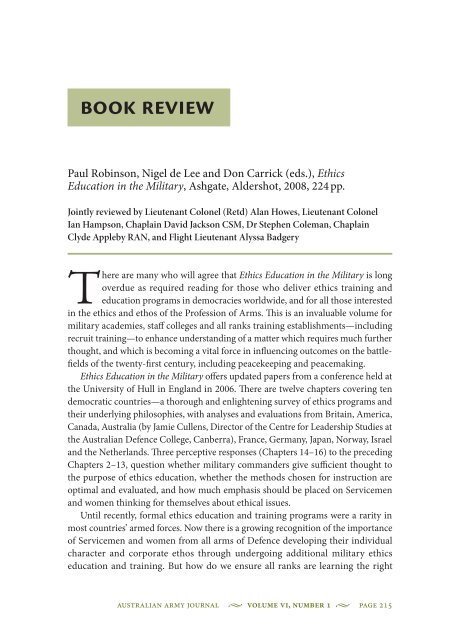Ethics Education in the Military by Paul Robinson ... - Australian Army
Ethics Education in the Military by Paul Robinson ... - Australian Army
Ethics Education in the Military by Paul Robinson ... - Australian Army
You also want an ePaper? Increase the reach of your titles
YUMPU automatically turns print PDFs into web optimized ePapers that Google loves.
Book Review<strong>Paul</strong> Rob<strong>in</strong>son, Nigel de Lee and Don Carrick (eds.), <strong>Ethics</strong><strong>Education</strong> <strong>in</strong> <strong>the</strong> <strong>Military</strong>, Ashgate, Aldershot, 2008, 224 pp.Jo<strong>in</strong>tly reviewed <strong>by</strong> Lieutenant Colonel (Retd) Alan Howes, Lieutenant ColonelIan Hampson, Chapla<strong>in</strong> David Jackson CSM, Dr Stephen Coleman, Chapla<strong>in</strong>Clyde Apple<strong>by</strong> RAN, and Flight Lieutenant Alyssa BadgeryThere are many who will agree that <strong>Ethics</strong> <strong>Education</strong> <strong>in</strong> <strong>the</strong> <strong>Military</strong> is longoverdue as required read<strong>in</strong>g for those who deliver ethics tra<strong>in</strong><strong>in</strong>g andeducation programs <strong>in</strong> democracies worldwide, and for all those <strong>in</strong>terested<strong>in</strong> <strong>the</strong> ethics and ethos of <strong>the</strong> Profession of Arms. This is an <strong>in</strong>valuable volume formilitary academies, staff colleges and all ranks tra<strong>in</strong><strong>in</strong>g establishments—<strong>in</strong>clud<strong>in</strong>grecruit tra<strong>in</strong><strong>in</strong>g—to enhance understand<strong>in</strong>g of a matter which requires much fur<strong>the</strong>rthought, and which is becom<strong>in</strong>g a vital force <strong>in</strong> <strong>in</strong>fluenc<strong>in</strong>g outcomes on <strong>the</strong> battlefieldsof <strong>the</strong> twenty-first century, <strong>in</strong>clud<strong>in</strong>g peacekeep<strong>in</strong>g and peacemak<strong>in</strong>g.<strong>Ethics</strong> <strong>Education</strong> <strong>in</strong> <strong>the</strong> <strong>Military</strong> offers updated papers from a conference held at<strong>the</strong> University of Hull <strong>in</strong> England <strong>in</strong> 2006. There are twelve chapters cover<strong>in</strong>g tendemocratic countries—a thorough and enlighten<strong>in</strong>g survey of ethics programs and<strong>the</strong>ir underly<strong>in</strong>g philosophies, with analyses and evaluations from Brita<strong>in</strong>, America,Canada, Australia (<strong>by</strong> Jamie Cullens, Director of <strong>the</strong> Centre for Leadership Studies at<strong>the</strong> <strong>Australian</strong> Defence College, Canberra), France, Germany, Japan, Norway, Israeland <strong>the</strong> Ne<strong>the</strong>rlands. Three perceptive responses (Chapters 14–16) to <strong>the</strong> preced<strong>in</strong>gChapters 2–13, question whe<strong>the</strong>r military commanders give sufficient thought to<strong>the</strong> purpose of ethics education, whe<strong>the</strong>r <strong>the</strong> methods chosen for <strong>in</strong>struction areoptimal and evaluated, and how much emphasis should be placed on Servicemenand women th<strong>in</strong>k<strong>in</strong>g for <strong>the</strong>mselves about ethical issues.Until recently, formal ethics education and tra<strong>in</strong><strong>in</strong>g programs were a rarity <strong>in</strong>most countries’ armed forces. Now <strong>the</strong>re is a grow<strong>in</strong>g recognition of <strong>the</strong> importanceof Servicemen and women from all arms of Defence develop<strong>in</strong>g <strong>the</strong>ir <strong>in</strong>dividualcharacter and corporate ethos through undergo<strong>in</strong>g additional military ethicseducation and tra<strong>in</strong><strong>in</strong>g. But how do we ensure all ranks are learn<strong>in</strong>g <strong>the</strong> right<strong>Australian</strong> <strong>Army</strong> Journal • Volume VI, Number 1 • page 215
Book Review • Howes, Hampson, Jackson, Coleman, Apple<strong>by</strong> and Badgerylessons? Can we, and should we, endeavour to achieve some uniformity, given <strong>the</strong>fact of military coalitions? The current lack of uniformity about what constitutesethical behaviour, and how military members should be educated and tra<strong>in</strong>ed, is acause for concern. To recognise what we need demands an understand<strong>in</strong>g of whatwe have. The reviewers agree with this book’s conclusion (p. 200) ‘that before fur<strong>the</strong>rprogress can be made <strong>in</strong> <strong>the</strong> field of ethics education <strong>in</strong> <strong>the</strong> military, we may needto some extent to return to basics, and exam<strong>in</strong>e <strong>in</strong> more detail what we consider<strong>the</strong> moral purpose of armed forces to be, and what <strong>the</strong>refore <strong>the</strong> purpose of ethicstra<strong>in</strong><strong>in</strong>g should be also’.Why should this book be reviewed <strong>by</strong> two serv<strong>in</strong>g ADF officers, two chapla<strong>in</strong>s, anacademic and a retired soldier, especially when only <strong>the</strong> academic amongst <strong>the</strong>m hasany formal qualifications <strong>in</strong> philosophy? The reason<strong>in</strong>g and justification is simple;because military laypeople are at <strong>the</strong> ‘coalface’ of responsibility for ethics <strong>in</strong>structionand leadership, we should encourage all ranks to read more widely and so become<strong>in</strong>volved <strong>in</strong> discussions about ethics <strong>in</strong> general and military ethics <strong>in</strong> particular.<strong>Ethics</strong> <strong>Education</strong> <strong>in</strong> <strong>the</strong> <strong>Military</strong> advances knowledge and understand<strong>in</strong>g of <strong>the</strong>issues associated with this subject of ethics teach<strong>in</strong>g and <strong>in</strong>struction, <strong>by</strong> br<strong>in</strong>g<strong>in</strong>gtoge<strong>the</strong>r experts from around <strong>the</strong> world to analyse <strong>the</strong> content, mode of <strong>in</strong>struction,<strong>the</strong>oretical underp<strong>in</strong>n<strong>in</strong>gs, and <strong>the</strong> effect of cultural and national differences with<strong>in</strong>current ethics programs. It explores whe<strong>the</strong>r such programs are best run <strong>by</strong> militaryofficers, chapla<strong>in</strong>s or academic philosophers, and it asks whe<strong>the</strong>r it is feasible todevelop common pr<strong>in</strong>ciples and approaches for <strong>the</strong> military <strong>in</strong> democracies.<strong>Ethics</strong> <strong>Education</strong> <strong>in</strong> <strong>the</strong> <strong>Military</strong> mentions ethics tra<strong>in</strong><strong>in</strong>g to a lesser extent thanethics education and does not attempt to address <strong>the</strong> implications on pedagogyaris<strong>in</strong>g from <strong>the</strong>se dist<strong>in</strong>ctions. As Dr Jessica Wolfendale well po<strong>in</strong>ts out <strong>in</strong> herresponse <strong>in</strong> Chapter 14, those engaged or <strong>in</strong>tend<strong>in</strong>g to become engaged <strong>in</strong> ethicsprograms <strong>in</strong> <strong>the</strong> military must first ask <strong>the</strong>mselves ‘why teach military ethics at all?’,s<strong>in</strong>ce any answer to this question will have implications on <strong>the</strong> ‘who, what, when, whyand how?’, and whe<strong>the</strong>r <strong>the</strong> result<strong>in</strong>g program will be primarily an educative process,hav<strong>in</strong>g developmental goals, or a tra<strong>in</strong><strong>in</strong>g process with learn<strong>in</strong>g outcomes.The reader will not f<strong>in</strong>d <strong>in</strong> this book <strong>the</strong> content for a program of ethics educationor tra<strong>in</strong><strong>in</strong>g <strong>in</strong> <strong>the</strong> military. Nei<strong>the</strong>r does <strong>the</strong> book <strong>in</strong>tend to give answers on <strong>the</strong>appropriate pedagogy. Never<strong>the</strong>less it does prompt <strong>the</strong> questions to ask, which <strong>in</strong>turn give direction on implement<strong>in</strong>g an ethics program. This presents a challengefor those <strong>in</strong>volved <strong>in</strong> ethics education and tra<strong>in</strong><strong>in</strong>g programs <strong>in</strong> <strong>the</strong> ADF. We canno longer simply do as we have always done; <strong>the</strong> nature of military operations ischang<strong>in</strong>g, <strong>the</strong> outlook of <strong>the</strong> young people enter<strong>in</strong>g <strong>the</strong> ADF today is different and,as <strong>Ethics</strong> <strong>Education</strong> <strong>in</strong> <strong>the</strong> <strong>Military</strong> well <strong>in</strong>dicates, <strong>the</strong> philosophical and ethical viewsaround <strong>the</strong> world are chang<strong>in</strong>g. For <strong>the</strong>se reasons alone, <strong>Ethics</strong> <strong>Education</strong> <strong>in</strong> <strong>the</strong><strong>Military</strong> is essential read<strong>in</strong>g for those <strong>in</strong>volved <strong>in</strong> ethics education and tra<strong>in</strong><strong>in</strong>g <strong>in</strong>page 216 • Volume VI, Number 1 • <strong>Australian</strong> <strong>Army</strong> Journal
<strong>Ethics</strong> <strong>Education</strong> <strong>in</strong> <strong>the</strong> <strong>Military</strong><strong>the</strong> ADF. The reviewers believe it can be put to good use <strong>by</strong> military officers and allo<strong>the</strong>rs <strong>in</strong>volved <strong>in</strong> ethics education and tra<strong>in</strong><strong>in</strong>g <strong>in</strong> <strong>the</strong> military such as chapla<strong>in</strong>sand academic lecturers; as well as be<strong>in</strong>g of use to politicians and o<strong>the</strong>r students ofmilitary affairs. This book provides a very valuable survey of a growth subject, andwe six reviewers thoroughly recommend it.<strong>Australian</strong> <strong>Army</strong> Journal • Volume VI, Number 1 • page 217
















